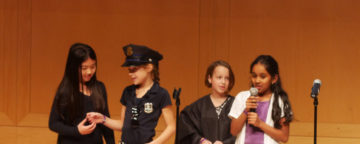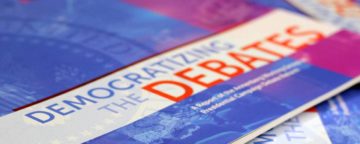Hundreds of fourth- and fifth-grade Philadelphia-area students showed off their impressive knowledge of the Fourth Amendment's prohibition on unreasonable search and seizure at the Rendell Center's Citizenship Challenge.


Hundreds of fourth- and fifth-grade Philadelphia-area students showed off their impressive knowledge of the Fourth Amendment's prohibition on unreasonable search and seizure at the Rendell Center's Citizenship Challenge.

A study using a real-world approach to evaluate graphic warning labels on cigarette packs has found that the emotionally engaging images are more successful than simple text warnings at educating smokers about the risks of smoking.

After a four-year run in which most news stories falsely linked the holiday season with an increase in suicide, last year's coverage saw a turnaround, with most news stories debunking the holiday-suicide myth, according to an analysis by the Annenberg Public Policy Center.

Annenberg Public Policy Center visiting scholar Dietram A. Scheufele has been appointed to a committee of the National Academies of Sciences, Engineering, and Medicine that will study the wide-ranging implications of human gene editing and make recommendations for future research and practices.

Philadelphia students got the opportunity to talk with two mayoral candidates about how to improve the city in a forum sponsored by the Rendell Center for Civics and Civic Education and the Annenberg Public Policy Center.

Thousands of immigrants from across the globe will be sworn in as American citizens, while students nationwide will take part in the “Preamble Challenge” to celebrate Constitution Day (Sept. 17).

In time for Constitution Day, Annenberg Classroom has released three videos dealing with constitutional protections and the rule of law, including habeas corpus in the Guantanamo Bay detention cases. Also back this fall is a popular online course about the Constitution from scholar Kermit Roosevelt.

Getting children to cut back on sugar-sweetened beverages like soda and energy drinks has been the goal of anti-obesity public service advertisements. A new study evaluates the effectiveness of persuasive techniques -- humor, fear and nurturance -- used in those PSAs.

The Annenberg Working Group on Presidential Campaign Debate Reform – a bipartisan group of top officials from past presidential campaigns – released its recommendations to help democratize the presidential general election debate process ahead of the 2016 presidential election.